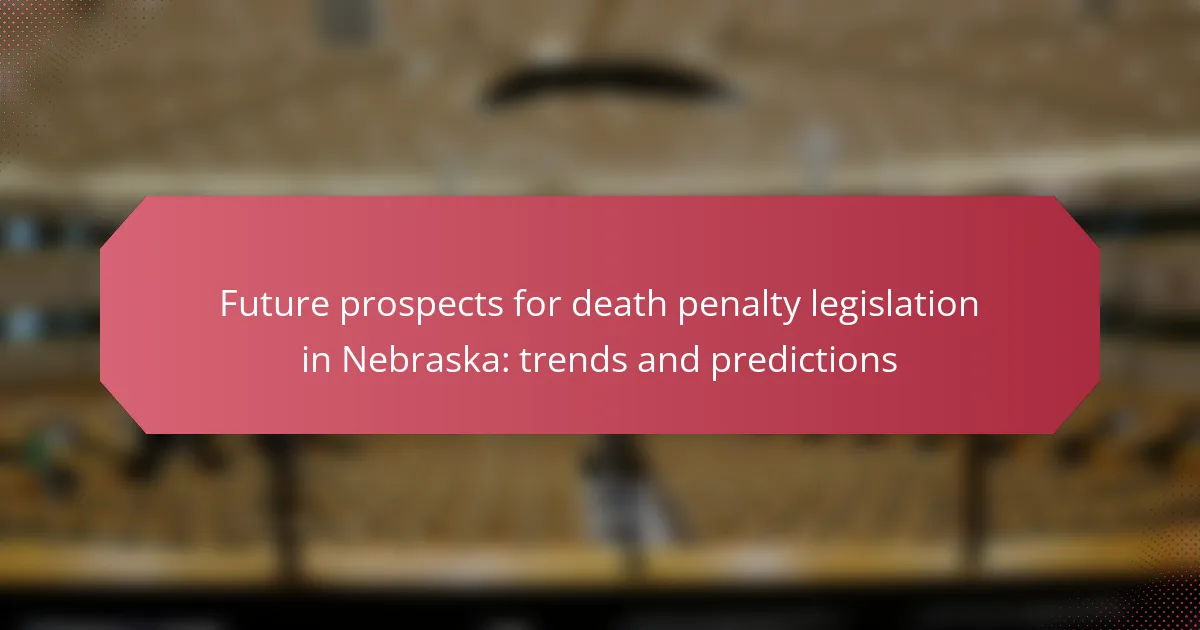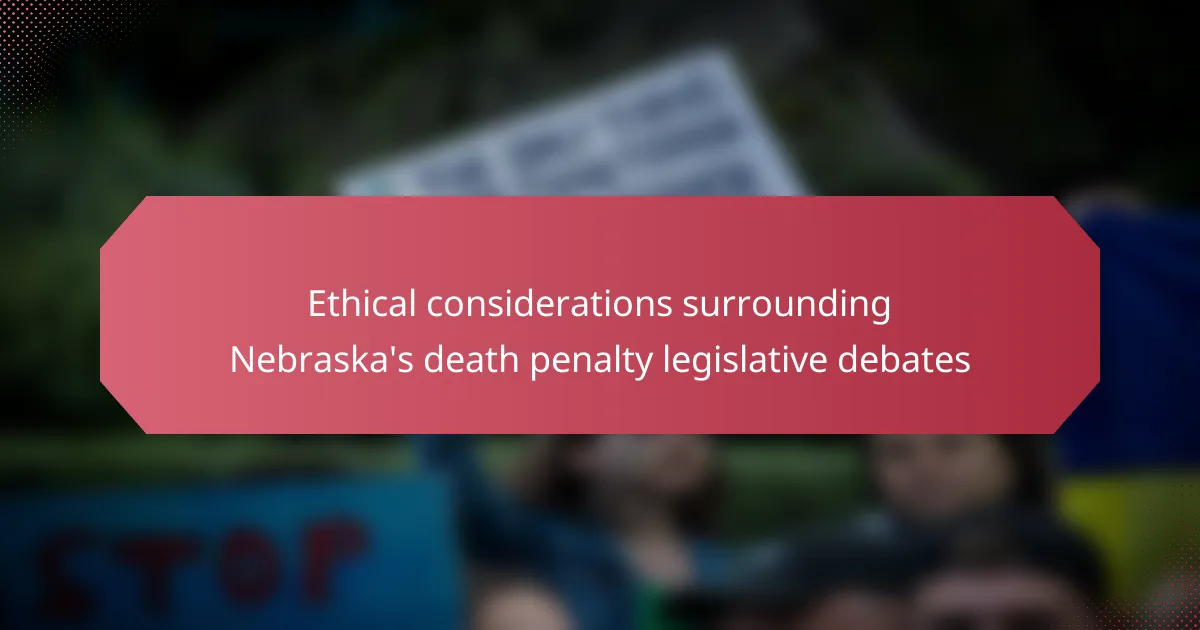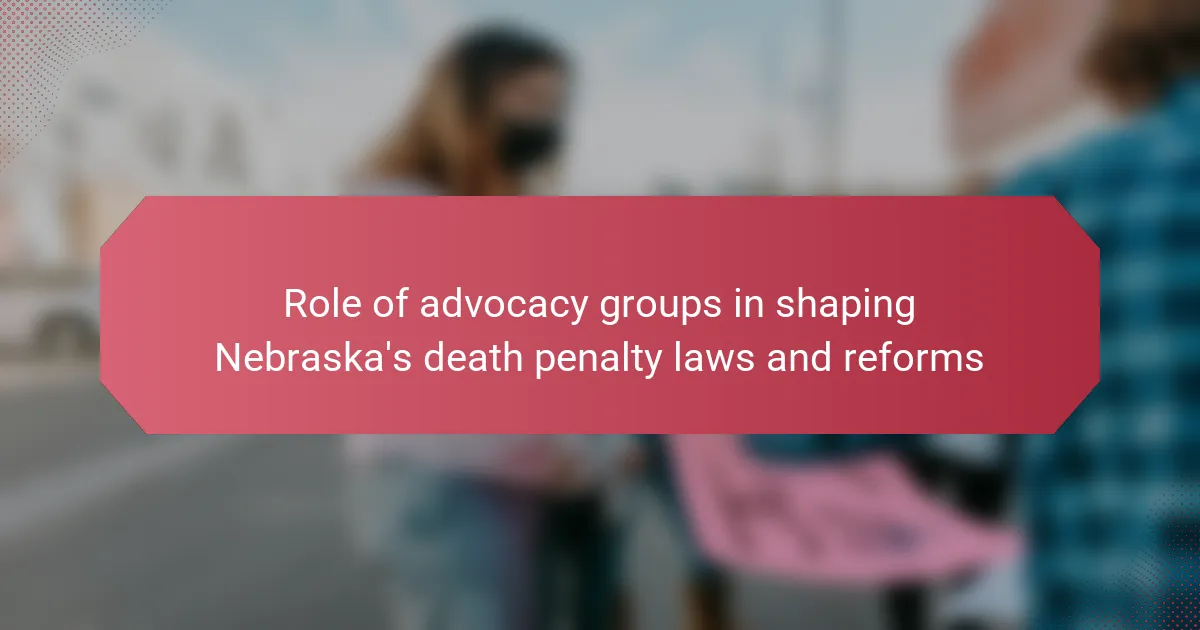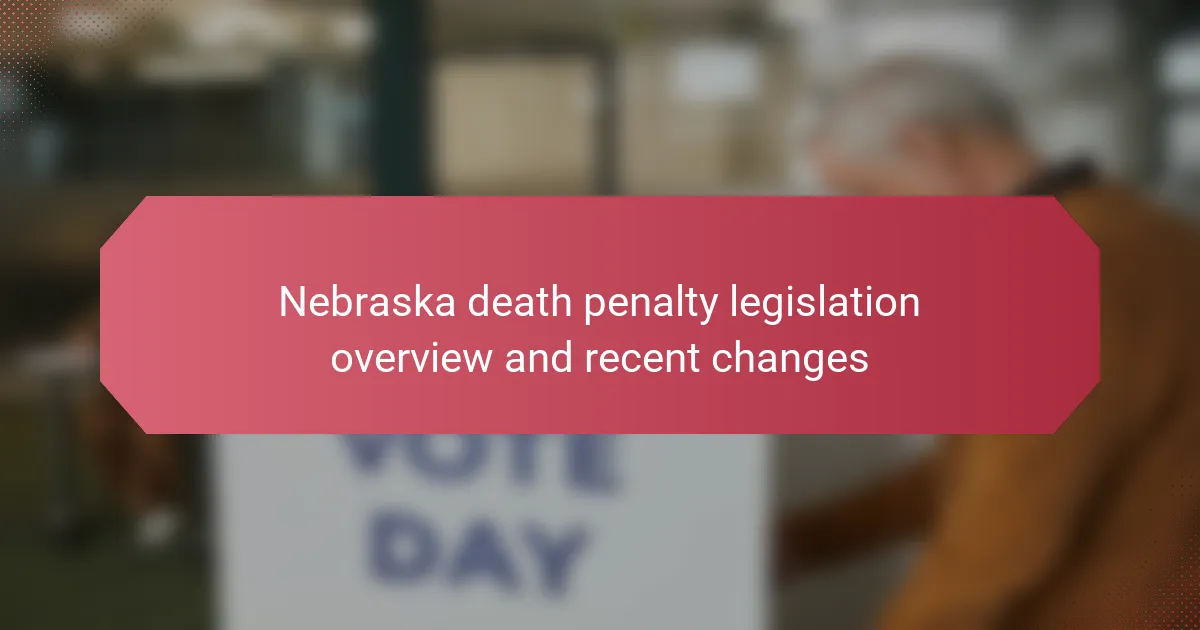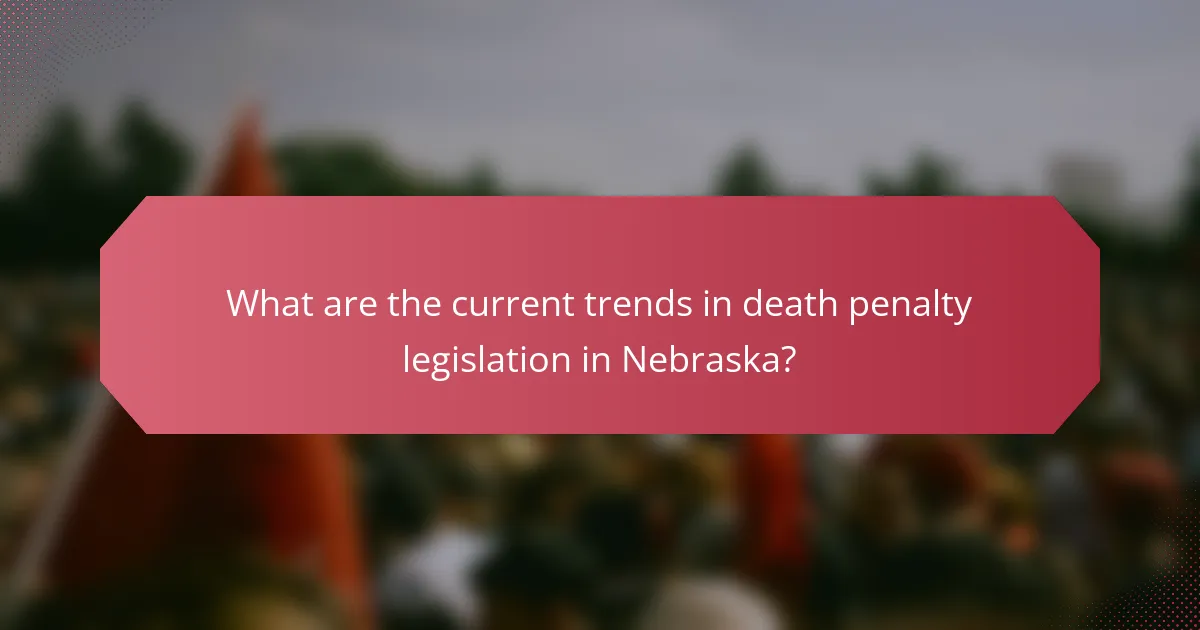
What are the current trends in death penalty legislation in Nebraska?
Current trends in death penalty legislation in Nebraska indicate a movement towards abolition. In recent years, there has been significant public and political discourse surrounding the death penalty’s effectiveness and morality. The Nebraska legislature has seen proposals aimed at repealing the death penalty. In 2015, the state abolished capital punishment, but a subsequent referendum reinstated it in 2016. Public opinion has shifted, with many citizens expressing support for alternatives to the death penalty. Advocacy groups are actively campaigning for reform, emphasizing the financial and ethical implications of capital punishment. The trend suggests a growing inclination towards life imprisonment without parole as a viable substitute for the death penalty in Nebraska.
How have recent events influenced public opinion on the death penalty in Nebraska?
Recent events have significantly influenced public opinion on the death penalty in Nebraska. The state has witnessed a series of high-profile cases and legal challenges surrounding the death penalty. These events have sparked intense debates among lawmakers and the public. For instance, the execution of high-profile inmates has drawn both support and opposition. Additionally, a 2020 poll indicated that 60% of Nebraskans support the death penalty, a decrease from previous years. Advocacy groups have also intensified their campaigns against capital punishment, citing moral and ethical concerns. Legislative discussions have reflected these shifts, with some lawmakers proposing to abolish the death penalty altogether. The overall sentiment appears to be moving towards reconsideration of capital punishment in light of recent events.
What role do high-profile cases play in shaping legislation?
High-profile cases significantly influence the shaping of legislation. They often bring attention to specific legal issues and societal concerns. This increased visibility can lead to public outcry and demand for change. Lawmakers may respond by proposing new laws or amending existing ones. For example, cases involving wrongful convictions can prompt reforms in the criminal justice system. Historical instances, such as the Furman v. Georgia case, led to a temporary halt in the death penalty in the U.S. High-profile cases can also sway public opinion, impacting voter behavior and legislative priorities. Thus, these cases play a crucial role in the legislative process by highlighting the need for reform and prompting action from policymakers.
How does media coverage affect public perception of the death penalty?
Media coverage significantly influences public perception of the death penalty. Extensive media reporting can shape opinions by highlighting specific cases or statistics. For instance, studies show that sensationalized stories often lead to increased support for capital punishment. Conversely, coverage focusing on wrongful convictions can decrease public support. According to a 2017 study published in the Journal of Criminal Justice, media framing plays a crucial role in shaping attitudes toward the death penalty. The portrayal of the death penalty in news outlets can either reinforce or challenge existing beliefs. Therefore, the nature and tone of media coverage are vital in determining public perception.
What are the key arguments for and against the death penalty in Nebraska?
The key arguments for the death penalty in Nebraska include deterrence of crime and justice for victims. Proponents argue that capital punishment serves as a deterrent against heinous crimes. They believe it provides closure to the victims’ families. Additionally, supporters claim it is a necessary tool for the most severe offenses.
Conversely, arguments against the death penalty focus on the risk of wrongful convictions and moral objections. Critics highlight that innocent individuals could be executed due to judicial errors. They also argue that the death penalty is not a proven deterrent to crime. Furthermore, opponents raise ethical concerns regarding state-sanctioned killing. According to a 2021 poll, a majority of Nebraskans favor life imprisonment over capital punishment.
What ethical considerations are involved in the debate over the death penalty?
The ethical considerations in the death penalty debate include justice, deterrence, and human rights. Justice raises questions about whether capital punishment is a fair and appropriate response to severe crimes. Deterrence examines if the death penalty effectively prevents crime, with studies showing mixed results. Human rights concerns focus on the right to life and the potential for wrongful executions. Additionally, there are arguments about the moral implications of state-sanctioned killing. The debate also involves socioeconomic and racial disparities in sentencing. These ethical considerations shape public opinion and influence legislative trends regarding the death penalty in Nebraska and beyond.
How do economic factors influence opinions on capital punishment?
Economic factors significantly influence opinions on capital punishment. Public perception often aligns with the financial implications of implementing the death penalty. Cost analyses show that capital cases are more expensive than life imprisonment. A study by the Urban Institute indicates that death penalty cases can cost up to three times more than non-capital cases. Economic downturns can lead to decreased support for costly legal processes. Additionally, areas with higher poverty rates may prioritize budget allocations differently. Economic arguments can sway public opinion towards alternatives to capital punishment. Overall, financial considerations play a crucial role in shaping attitudes towards the death penalty.
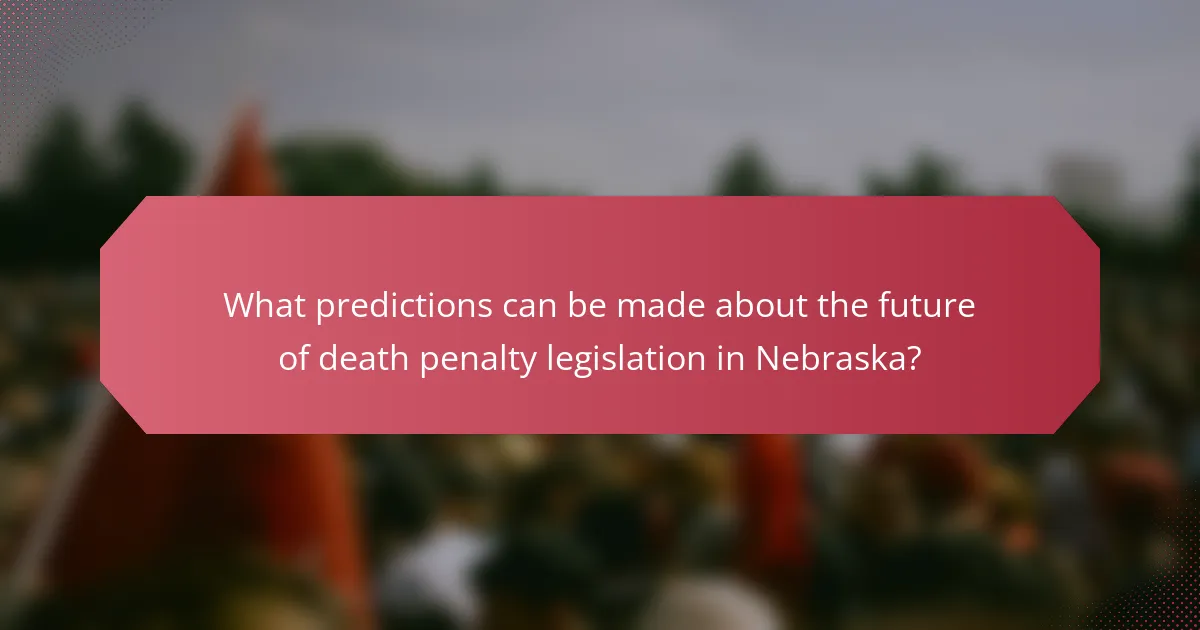
What predictions can be made about the future of death penalty legislation in Nebraska?
Future death penalty legislation in Nebraska may trend towards abolition. Public opinion has shifted against capital punishment in recent years. Legislative efforts have been made to repeal the death penalty. In 2015, Nebraska’s legislature passed a bill to abolish it, but it was later overturned by a referendum. Current discussions indicate a growing bipartisan interest in reform. Additionally, neighboring states have also moved towards abolition, influencing Nebraska’s legislative landscape. These trends suggest a potential for significant changes in the coming years. Historical data shows that states with declining death sentences often lead to legislative reforms.
How might changes in political leadership impact death penalty laws?
Changes in political leadership can significantly impact death penalty laws. New leaders may have differing views on capital punishment. For instance, a governor who opposes the death penalty might push for its repeal. Conversely, a pro-death penalty leader could advocate for its expansion. Legislative priorities often shift with new administrations. Historical examples show that states like Illinois and California altered their death penalty laws following changes in leadership. In Illinois, Governor George Ryan imposed a moratorium in 2000, leading to eventual abolition. In California, recent governors have sought to halt executions. Therefore, political leadership plays a crucial role in shaping the future of death penalty legislation.
What historical patterns can be observed in legislative changes regarding capital punishment?
Legislative changes regarding capital punishment have historically fluctuated based on societal attitudes, legal challenges, and political climates. In the late 20th century, many states began to impose moratoriums on executions due to concerns over wrongful convictions and racial bias. For instance, Illinois Governor George Ryan declared a moratorium in 2000 after several death row inmates were exonerated.
Additionally, states such as New Jersey and New York abolished the death penalty entirely in the 2000s, reflecting a growing trend toward abolition. Conversely, some states have reinstated capital punishment after temporary bans, indicating a cycle of legal and public opinion shifts.
Recent patterns show increased scrutiny of the death penalty’s application, leading to legislative efforts aimed at reform rather than outright abolition. For example, several states have passed laws to limit the use of capital punishment or to increase transparency in the process. These historical patterns highlight a complex interplay between evolving moral perspectives and legal frameworks surrounding capital punishment.
How do shifts in party control affect the likelihood of reforms?
Shifts in party control significantly affect the likelihood of reforms. When one party gains control, it often brings a new agenda and priorities. For example, if a party that supports reform takes power, the chances of implementing changes increase. Conversely, if a party opposing reform assumes control, the likelihood of changes diminishes. Historical patterns show that states with legislative shifts often see corresponding changes in policies. In Nebraska, for instance, the 2015 repeal of the death penalty occurred under a Republican governor and a supportive legislature. This illustrates how party control can directly influence reform outcomes.
What role do advocacy groups play in shaping the future of the death penalty?
Advocacy groups significantly influence the future of the death penalty. These organizations campaign for legislative changes and raise public awareness. They provide research and data to support their positions. Advocacy groups often lobby lawmakers to reconsider existing laws. They mobilize public opinion through campaigns and media outreach. For instance, groups like the Innocence Project highlight wrongful convictions. Their efforts have led to moratoriums and repeals in several states. In Nebraska, advocacy groups are pivotal in shaping discussions around death penalty legislation. They challenge the moral and ethical implications of capital punishment.
What strategies are employed by pro-death penalty organizations?
Pro-death penalty organizations employ several strategies to advocate for capital punishment. They often focus on legislative lobbying to influence lawmakers. These organizations conduct public awareness campaigns to educate citizens on their stance. They provide legal support to ensure the enforcement of death penalty laws. Many engage in research to present data supporting their position. They also form coalitions with other like-minded groups to strengthen their influence. Fundraising efforts help sustain their activities and outreach programs. Additionally, they utilize social media to reach a broader audience. These strategies are aimed at maintaining and expanding the use of the death penalty in jurisdictions like Nebraska.
How do anti-death penalty advocates influence legislative processes?
Anti-death penalty advocates influence legislative processes by mobilizing public opinion and lobbying lawmakers. They raise awareness about the moral, legal, and financial implications of the death penalty. Their campaigns often include testimonies from exonerees and families of victims. These narratives humanize the issue, making it more relatable to the public and legislators. Research shows that states with active advocacy groups tend to see legislative proposals against the death penalty. For example, in Nebraska, advocacy efforts contributed to the repeal of the death penalty in 2015. This repeal was supported by a coalition of religious groups, civil rights organizations, and legal experts. Their collective efforts demonstrate the impact of grassroots movements on policy change.
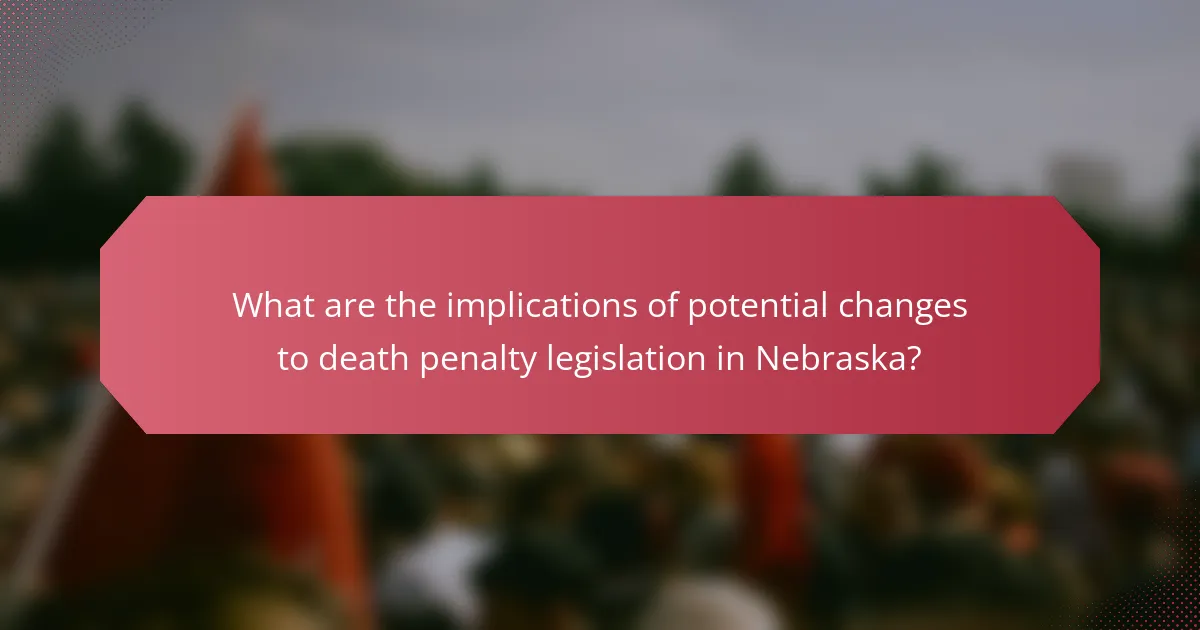
What are the implications of potential changes to death penalty legislation in Nebraska?
Potential changes to death penalty legislation in Nebraska could significantly impact the state’s criminal justice system. These changes may lead to shifts in public opinion regarding capital punishment. A reduction or abolition of the death penalty could result in increased life sentences without parole for serious crimes. This transition may also affect the allocation of state resources, as capital cases are often more expensive due to lengthy legal processes. Furthermore, changes could influence the state’s deterrence of crime, as the effectiveness of the death penalty in preventing offenses is debated. Historical data shows that states with moratoriums or abolished death penalties often see varying crime rates. Overall, legislative changes could reshape Nebraska’s approach to justice and punishment.
How would changes in legislation affect the judicial system in Nebraska?
Changes in legislation can significantly impact the judicial system in Nebraska. New laws may alter sentencing guidelines, affecting how cases are prosecuted and adjudicated. For instance, modifications to death penalty statutes could change the procedures for capital cases. This may lead to more appeals or retrials, influencing court caseloads. Additionally, shifts in legislation can affect the resources allocated to the judicial system. Increased funding may enhance public defense services, while cuts could strain judicial operations. Historical context shows that similar legislative changes in other states have led to varied outcomes in judicial efficiency and fairness.
What challenges might arise from implementing new death penalty laws?
Implementing new death penalty laws may lead to various challenges. Legal challenges can arise from constitutional scrutiny regarding due process and cruel and unusual punishment. Public opinion may also present difficulties, as it can be deeply divided on the issue. Financial implications are significant; new laws often require substantial funding for legal proceedings and execution methods. Additionally, there may be logistical challenges in carrying out executions, including the procurement of drugs for lethal injection. Ethical concerns surrounding the death penalty can complicate implementation, as advocates argue against its morality. Finally, potential errors in the judicial process can lead to wrongful convictions, raising serious ethical and legal questions.
How could changes in legislation impact crime rates and public safety?
Changes in legislation can significantly impact crime rates and public safety. For instance, stricter laws may deter criminal behavior by increasing the consequences of illegal actions. Research shows that states with harsher penalties often experience lower crime rates. Conversely, more lenient laws can lead to increased crime, as offenders may perceive a lower risk of punishment.
For example, the repeal of certain mandatory minimum sentences in various states has been linked to a rise in property crimes. Additionally, legislative changes that enhance community policing can improve public safety by fostering trust between law enforcement and communities. Historical data indicates that regions with proactive legislative measures often report higher levels of public safety and lower crime rates. Changes in legislation, therefore, play a crucial role in shaping the landscape of crime and safety in society.
What best practices can be adopted for engaging in discussions about death penalty legislation?
Engaging in discussions about death penalty legislation requires a respectful and informed approach. First, participants should research the current laws and statistics related to the death penalty. This includes understanding the legal framework and historical context of the legislation. Second, individuals should listen actively to differing viewpoints. This fosters a constructive dialogue and helps identify common ground. Third, using credible sources to support arguments is essential. Citing studies or expert opinions enhances the validity of the discussion. Fourth, addressing emotional aspects with sensitivity is crucial. Death penalty discussions often evoke strong feelings, so acknowledging these emotions can lead to more productive conversations. Lastly, encouraging open-ended questions can stimulate deeper exploration of the topic. This helps participants engage more thoughtfully and critically.
How can individuals effectively communicate their views on the death penalty?
Individuals can effectively communicate their views on the death penalty by using clear and concise language. They should articulate their stance with supporting arguments. Engaging with factual evidence strengthens their position. For instance, citing statistics on wrongful convictions can highlight potential flaws in the system. Additionally, participating in public forums allows for direct dialogue. Writing opinion pieces in local newspapers can reach a broader audience. Utilizing social media platforms can also amplify their message. Engaging in respectful discussions with opposing views fosters understanding. Overall, combining facts with personal narratives makes the communication more impactful.
What resources are available for those seeking to understand the complexities of the issue?
Key resources for understanding the complexities of death penalty legislation in Nebraska include academic journals and legal databases. Scholarly articles provide in-depth analysis of trends and case studies. The Nebraska State Legislature website offers current bills and legislative history. Nonprofit organizations, like the Death Penalty Information Center, compile statistics and reports. Books on criminal justice provide historical context and theoretical frameworks. News outlets often publish investigative pieces on public opinion and legal changes. Legal textbooks cover constitutional aspects and landmark cases. These resources collectively enhance comprehension of the evolving landscape of death penalty legislation in Nebraska.
The main entity of this article is death penalty legislation in Nebraska. The article examines current trends indicating a shift towards abolition, influenced by public opinion, high-profile cases, and advocacy efforts. It discusses the impact of media coverage on perceptions, key arguments for and against capital punishment, and the role of economic factors in shaping opinions. Additionally, it explores the implications of potential legislative changes on the judicial system and public safety, while highlighting best practices for engaging in discussions about the death penalty. The article concludes with predictions regarding the future of death penalty legislation in Nebraska, emphasizing the evolving landscape of this contentious issue.
